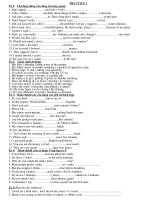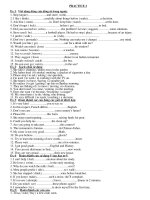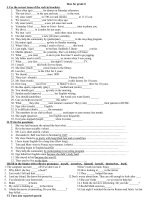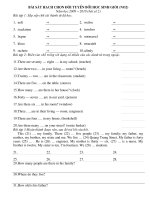Grade 8 - Exercises for 2nd semester
Bạn đang xem bản rút gọn của tài liệu. Xem và tải ngay bản đầy đủ của tài liệu tại đây (158.68 KB, 5 trang )
ÔN THI HỌC KỲ 2 (ENGLISH 8)
I. GRAMMAR
A,TENSES:
1, Present tense (thì hiện tại) 2, Past tenses(Thì quá khứ)
(+)S + Vs/Ves + O (+) S + V-ed / V(2) + O
(-) S + don’t /doesn’t +V + O (-) S + didn’t + V + O
(? ) Do /Does + S +V + O? (?) Did + S + V + O?
Key words : every, always, usually, often , Key words : last, yesterday, ago…
sometimes………
Ex: My father gets up at five every morning Last year, my family went to Nghe An
I don’t like fish. He didn’t go to school yesterday
Does he have lunch at 11am.? When did they leave?
3. Present progressive (thì hiện tại tiếp diễn)
(+) S + am/is/are + V-ing Ex: He is reading a book at the moment.
(-) S + am not/isn’t/aren’t +V-ing I’m not studying English now.
(?) Am/Is/Are + S +V-ing…? What are you doing now?
Key words: now, at the moment, at present, today, this week,…
* ALWAYS with progressive: always dùng với thì tiếp diễn để diễn tả sự kiện thường xuyên xảy ra với sự
không hài lòng hay than phiền (Ex: He is always coming to work late.)
3, Past progressive (Thì quaù khöù tieáp dieãn)
(+) S + was /were + V-ing Ex: Last night when I was doing homework, the
(-) S + wasn’t /weren’t + V-ing electricity went out.
(?) Was /Were + S + V-ing….? Ex: What were you doing at 2 p.m. yesterday?
4, Future tenses(Thì töông lai ñôn)
(+) S + will / shall + V + …………. Ex: He will finish his homework tomorrow .
(-) S+ won’t / shan’t + V + ……… Lan won’t go to the zoo next week.
(?) Will / Shall + S + V + ………. ? Will you do this exercise ?
Key words : tomorrow, next, tonight…
5, Present perfect(Thì hiện tại hoàn thành)
(+) S + Have /Has +V3/ed Ex: You have studied English for 4 years.
(-) S + Haven’t /Hasn’t + V3/ed She hasn’t studied English since 2003.
(? ) Have / Has + S +V3/ed Has your father planted trees ye t ?
Key words : since, for, just, already, yet… Ex: I have already finished this work.
B . The passive form
Form: S + BE + V
3
/V-ed (past participle) + by + O
Note:- Khi chủ ngữ câu chủ động là: THEY, PEOPLE, SOMEONE, NO ONE, ANYONE………. thì khi đổi
sang câu bị động không có By agent . N hưng khi danh từ làm chủ ngữ bắt buộc phải có agent.
Tenses Active form ( chủ động) Passive form ( bị động)
1/Simple present S + V(-s/es) + O S + am/is/are +V-ed/V3 + by O
2/Simple past S + V-ed/V2 + O S + was/were +V-ed/V3 + by O
3/Present progressive S + am/is/are + V-ing S + is/are + BEING + V-ed/V3 +……by O
4/Past progressive S + was/were + V-ing S + was/were + BEING + V-ed/V3 +…by O
5/Present perfect S + have/has + V-ed/V3+O S + have/has +BEEN+V-ed/V3 + by O
6/Simple Future S + will + V(bare-inf) + O S + will + BE +V-ed/V 3 + by O
- Với động từ đặc biệt (modal verbs): CAN, MUST, MAY, MIGHT, SHOULD, WILL,…
7/ S + modal verb + BE + V-ed / V
3 ……
Ex: 1/ John prepares his lessons carefully. His lessons are prepared carefully by John.
2/Thomas Edison invented the photograph. The photograph was invented by Thomas Edison.
2/They didn’t help me to do the work. I wasn’t helped to do the work.
5/His father has collected stamps for ten years. Stamps has been collected for ten years by his father.
5/Nobody has used this machine for years. This machine hasn’t been used for years.
6/Our team will win the game tomorrow. The game will be won by our team tomorrow.
7/You must do this exercise carefully. This exercise must be done carefully.
7’/ The secretary is going to fax the letters .The letters are going to be faxed by the secretary.
C. Reported speech ( lời nói trần thuật ) là câu thuật lại một cách gián tiếp lời nói của người khác.
- Nếu động từ tường thuật ở thì hiện tại thì thì của động từ chính được giữ nguyên khi chuyển lời nói trực
tiếp sang gián tiếp.Trạng từ chỉ nơi chốn,thời gian và đại từ chỉ định được giữ nguyên.
Ex: “I’m arriving at 6:00” says she. – She says (that) she’s arriving at 6:00.
-Nếu động từ thường thuật (reporting verb) của câu ở thì quá khứ thì phải lùi động từ chính về một bậc khi
chuyển từ lời nói trực tiếp (direct speech) sang lời nói gián tiếp (indirect / reported speech) theo quy tắc sau :
Direct speech Reported speech
is/am was
are were
have/has had
will would
can could
must had to
shall should
may might
don’t/ doesn’t didn’t
* Một số chuyển đổi khác: Khi chuyển từ lời nói trực tiếp sang gián tiếp mà động từ tường thuật ở thì quá
khứ thì các trạng từ chỉ thời gian và nơi chốn và đại từ chỉ định được chuyển đổi theo quy tắc sau :
Direct speech Reported speech
today / tonight that day / that night
tomorrow the following day/ the day after/ the next day
yesterday the day before /the previous day
ago / now before / then
next/ on Monday the next/ following Monday
last Monday the previous Monday / the Monday before
the day after tomorrow in two days’ time / two days later
this / these that / those
here there
Một số loại câu tường thuật
1. Yes- No questions: (câu hỏi yes-no)
Form: S + asked + ( O ) + if/ whether + S + V ( lùi 1 thì )
Ex: “ Do you see new friends?” he said to me → He asked if I saw new friends.
2. Statements : ( câu kể )
Form : S + said + ( that ) + S + V (l ùi 1 thì )
told + O
Ex: “ I’m leaving here tomorrow,” said Mary
- Mary said (that) she was leaving there the following day.
3. Requests, commands/advice : (câu mệnh lệnh)
Form : S + asked /told …+ O + ( NOT) to-inf.
Ex:“Please wait for me here, Lisa.” Peter said . –Peter told Mary to wait for him there.
“Don’t talk in class!” the teacher said -The teacher told the children not to talk in class.
D. Phrases of purpose : (cụm từ dùng để diễn tả mục đích)
(+) to / in order to / so as to + V(inf.)
Ex: I study English in order to communicate with foreigners
(-) in order not to / so as not to + V(inf.)
Ex: He gets up early so as not to be late for school.
E. -ed and -ing participle ( Quá khứ và hiện tại phân từ )
- Hiện tại phân từ “V- ING” còn gọi là phân từ tác động. Ex: His job is boring.
- Quá khứ phân từ “ V-ED/V3” còn gọi là phân từ bị tác động. Ex: This clock is broken.
* Quá khứ và hiện tại phân từ : Đứng trước danh từ, hoặc sau động từ liên kết
Ex: A tired worker is sleeping on the chair. The story is interesting
* Quá khứ và hiện tại phân từ: được dùng để rút gọn mệnh đề tính từ
Ex: The boy is in my class . He’s reading a book. → The boy reading a book is in my class.
There are many books. They are written in English. → There are many books written in English.
F. Compound nouns ( danh từ kép): N1 – V_ing – N2
Ex: It’s a rice-cooking contest.
G. Would you mind/Do you mind ?
*Yêu cầu ai làm gì : Would you mind/ Do you mind + V-ing ?
Ex : Woud you mind opening the window?
* Xin phép ai làm gì: Would you mind if I + V ( simple past )
Do you mind if I + V ( simple present)
Ex: Would you mind if I used your phone?
Do you mind if I use your phone?
H. …. find + O + Adj ….
Ex: I find your magazine very informative
I. Sử dụng nguyên mẫu không “to” ( Bare inf )
1.Sau cụm từ :would rather ( thà rằng , thích hơn )
Ex: :They would rather have you in their class
2.Sau cụm từ : Had better ( nên ).
Ex: They had better tell me the truth.
3. Ở thể truyền khiến ( causative form ) sai,bảo,nhờ,→Dùng với “have”.
* S + have/has + NGƯỜI + V(bare inf ).
* S + have/has + VẬT + V3/V-ed.
Ex: He had his father fix his watch.
He had his watch fixed.
4.Trong cấu trúc : S + ( make/let ) + O + bare inf
Ex: He made me do it .
Let me go .
5.Sau các động từ khiếm khuyết : can , may , must , will , shall,should, would …
Ex: They may stay at home.
J. Sử dụng nguyên mẫu có “to” (to inf )
1. Trong cấu trúc : It + be + adj + to inf.
( Các tính từ thường dùng cho cấu trúc này là : happy, eager, ready, glad, anxious, nice, kind,
difficult, easy,….)
Ex: It’s difficult to make friends in a new school .
2. Trong cấu trúc: Have a chance / an opportunity + to inf . (Có cơ hội / dịp để làm việc gì …)
Ex: My father had a chance to go abroad .
3. Trong cấu trúc : S + be + adj + enough + to inf.
Ex: : Tom is old enough to go to school by bicycle.
4. Trong cấu trúc : S + be + too + adj + to inf .
Ex: They are too young to work hard .
5. Sau những động từ: agree, arrange(sắp xếp), ask, decide, help, hope, offer(ngỏ ý), plan(vạch kế
hoạch), prepare(chuẩn bị), promise(hứa), want, wish, volunteer(tình nguyện)……
Ex: I’ve arranged to play tennis tomorrow afternoon.
6.ask, decide, know, remember, forget, explain , learn, understand, wonder + what / where / when /
how + to-inf.
Ex: I don’t know what to do.
7. show / tell / ask / advise / teach someone what / how / where to do something
Ex: Can you show me how to use this machine?
K. Sử dụng nguyên mẫu thêm ing ( V_ing )
1.Sau các giới từ ( prepositions ) : in , at , for , of , about , by , with , without , on ,…
Ex:The eighth form pupils are interested in reading books .
2.Sau các liên từ ( cọnunctions ) : after , before , when , while…….
Ex: After telling me the secret , they left.
3. Sau các động từ : admit (công nhận ),enjoy( thưởng thức ),escape( trốn thoát ), advoid(tránh xa),
consider( xem xét ), imagine( tưởng tượng ), finish( kết thúc ), forgive( tha thứ ), keep=continue, love
mind( lưu ý, làm phiền),miss( nhớ ),prefer( thích hơn ), save( cứu,tiết kiệm ), suggest, understand……
Ex: Most people prefer riding to walking
*NOTES:
- To begin/start/continue/intend→inf. / gerund.
- To advise/allow(cho phép)/admit/encourage/permit/recommend/propose/suggest
→ + gerund
+ O + to inf .
- To regret/remember/forget:→ To inf. ( Xảy ra sau đó ,nhiệm vụ )
→ Gerund( Xảy ra trước đó ).
- To like :→ To inf (want , wish )
→Gerund (enjoy:hobbies/interests.)
- To mean :→ inf (ý định)
→Gerund (đòi hỏi ,liên quan ).
- To try : → inf ( cố gắng )
→Gerund (thử ,thí nghiệm ) .
- To stop : → inf : dừng lại để làm một việc khác .
→Gerund : ngừng hẳn .
- To go on : → inf : làm một việc khác ,mới.
→Gerund : tiếp tục .
- To purpose : → inf : dự định .
→Gerund : đề nghị .
L. Useful prepositions ( giới từ thông dụng)
Calm down : bình tỉnh help sb. with sth. : giúp đỡ ai việc gì
Fall off : rơi, ng ã lean over : cúi, ngả người
Ask for : y êu cầu về, xin be interested in sth.: yêu thích, quan tâm đến
Cover…with : phủ, che…lại bằng be suitable for : hợp với
Instead of : thay vì be fond of sth. : yêu thích
Begin with : bắt đầu với For example : ví dụ như
Throw……away: ném, quăng đi pick sb. up : đón ai
Made from : được làm từ (nhiều thành p ần) carve into sth. : chạm, khắc lên
Made of: được làm từ (thành phẩm và chất liệu lá một)
Made into : đư ợc làm, chế biến thành be keen on sth.: say mê, ham thích cái gì
Share….with : chia sẻ với thank sb. for doing sth :cám ơn ai về điều gì
Belong to : thuộc về, của participate in sth. : tham gia vào
Wonder at sth. : ngạc nhiên về
A memorial to the dead : đài tưởng niệm người đã hy sinh, v ật tưởng nhớ người đã mất
Have claim / no claim on/to sth : (không) có quyền sở hữu về / có được cái gì
Make no claim + to-inf. : không thể làm việc gì
M. Irregular verbs (đ ộng t ừ b ất qui t ắc)
Be was/were been thí, là, ở begin began begun bắt đầu
Bleed bled bled chảy máu fly flew flown bay
Hit hit hit va trúng leave left left rời,
Let let let để cho, cho phép fall fell fallen rơi ng ã
Sit sat sat ngồi sleep slept slept ngủ
Stand stood stood đứng become became become trở n ên
Find found found tìm thấy wear wore worn mặc
Grow grew grown trồng, mọc, phát triển write wrote written viết
Say said said nói think thought thought nghĩ
Send sent sent gửi hear heard heard nghe
See raw seen thấy meet met met gặp
Throw threw thrown quăng, ném have had had có
Bring brought brought mang đến build built built xây dựng
Buy bought bought mua get got got đến, nhận
Lose lost lost mất, thua take took taken dắt đi









